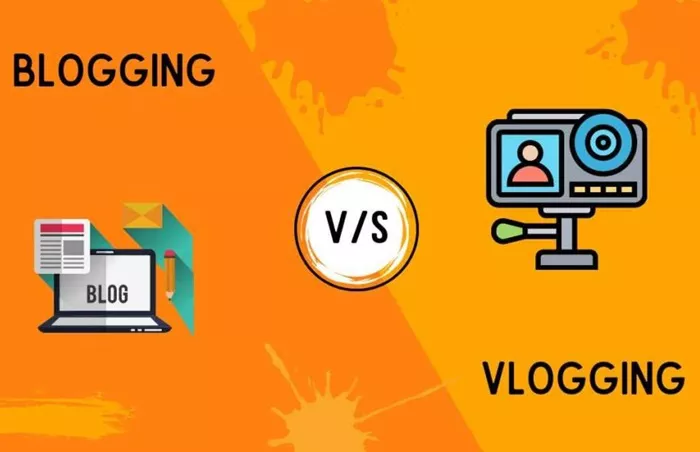In today’s digital age, content creation has evolved into a multifaceted realm, offering countless avenues for self-expression, storytelling, and audience engagement. Two of the most popular forms of content creation are vlogging and blogging. While both serve as platforms for sharing information, opinions, and experiences, they cater to different audiences and utilize distinct mediums. This article explores the key differences between vlogging and blogging, delving into their characteristics, advantages, and unique appeal.
Understanding Blogging
Blogging, derived from the term “weblog,” is a written medium where individuals share ideas, insights, or experiences through text-based content. Bloggers typically focus on creating detailed articles, essays, and guides hosted on websites.
Key Characteristics of Blogging
Text-Centric Content: Blogs are primarily composed of text, though they often include supporting elements like images, infographics, and hyperlinks to enhance readability and engagement.
Diverse Topics: Bloggers cover an expansive range of subjects, including travel, fashion, health, technology, and personal development, often tailoring their content to niche audiences.
Static Medium: Blogs are static in nature, meaning they do not require real-time interaction. Readers consume the content at their convenience, providing a timeless value to well-written pieces.
Search Engine Optimization (SEO): Bloggers utilize SEO strategies to ensure their content ranks well on search engines, driving organic traffic to their sites. Effective SEO involves the use of keywords, meta descriptions, and backlinking.
Monetization Options: Blogs can generate revenue through affiliate marketing, sponsored posts, advertisements, and product sales.
Understanding Vlogging
Vlogging, short for “video blogging,” involves creating video content that captures real-life moments, tutorials, opinions, or creative storytelling. Vlogs are typically hosted on video-sharing platforms such as YouTube, TikTok, or Vimeo.
Key Characteristics of Vlogging
- Video-Centric Content: Vlogs rely on visual and auditory elements to communicate messages, often showcasing the creator’s personality, tone, and emotions more vividly than text can.
- Dynamic and Engaging: The moving visuals and real-time expressions in vlogs create a dynamic experience, making them highly engaging for viewers.
- Real-Time Interaction: Many vloggers host live streams or actively respond to comments, fostering direct interaction with their audience.
- Technical Requirements: Vlogging demands a range of equipment, such as cameras, microphones, and video editing software, to produce high-quality content.
- Platform-Specific Growth: Unlike blogs, vlogs heavily depend on video platforms for distribution and visibility. These platforms often reward consistency and engagement through algorithms.
Key Differences Between Blogging and Vlogging
While both blogging and vlogging are storytelling methods, their differences extend beyond the medium of communication. Here’s an in-depth comparison:
1. Medium of Content
Blogging: Primarily text-based, supplemented with images or graphics.
Vlogging: Relies on video format, often incorporating music, animations, and other effects.
2. Accessibility
Blogging: Requires basic literacy and internet access. Readers can skim through articles.
Vlogging: Requires a device capable of streaming video and a platform like YouTube or TikTok.
3. Skill Set
Blogging: Strong writing skills, SEO knowledge, and the ability to structure information concisely.
Vlogging: On-camera confidence, video editing expertise, and storytelling through visuals.
4. Equipment Needed
Blogging: Minimal equipment—typically just a computer or smartphone for writing and publishing.
Vlogging: A camera, tripod, microphone, lighting, and video editing tools are often necessary.
5. Time Investment
Blogging: Time is spent researching and writing; however, publishing is straightforward.
Vlogging: Filming and editing can be time-intensive, particularly for polished, high-quality videos.
Advantages of Blogging
Timeless Value: A well-written blog post can remain relevant for years, providing consistent traffic and engagement.
Lower Entry Barrier: Blogging requires minimal resources and is accessible to anyone with writing skills.
SEO Benefits: Blogs offer opportunities for keyword optimization, increasing visibility on search engines.
Passive Monetization: Bloggers can earn passive income through ads or affiliate links embedded in posts.
Advantages of Vlogging
Personal Connection: Vlogging allows creators to connect with their audience on a deeper level through facial expressions, voice, and personality.
Broader Reach: Video content is highly shareable and more likely to go viral than written content.
Versatile Content: Vlogs can include tutorials, lifestyle diaries, behind-the-scenes footage, and more, catering to diverse preferences.
Higher Engagement: Video content garners higher engagement rates due to its dynamic nature.
Challenges in Blogging and Vlogging
Blogging Challenges
Content Saturation: The internet is crowded with blogs, making it challenging to stand out.
Consistent Updates: Regular updates are necessary to maintain audience interest.
SEO Complexity: Effective SEO requires continuous learning and adaptation.
Vlogging Challenges
High Competition: Platforms like YouTube are saturated with content, making visibility a challenge.
Technical Demands: Producing high-quality videos can be resource-intensive.
Burnout Risk: The pressure to consistently upload engaging content can lead to burnout.
Which One Should You Choose?
The decision to blog or vlog depends on your skills, resources, and target audience.
Choose Blogging If:
-
- You enjoy writing and prefer a lower-budget entry point.
- Your niche lends itself well to detailed, text-based content (e.g., technical guides, in-depth analyses).
Choose Vlogging If:
-
- You’re comfortable on camera and want to showcase your personality.
- Your content is better suited to visual storytelling (e.g., travel experiences, product demonstrations).
Conclusion
Both vlogging and blogging are powerful tools for content creators, offering unique benefits and challenges. Blogging emphasizes written expression and timeless value, while vlogging shines through dynamic, engaging video content. Understanding the nuances of each medium enables creators to select the format that aligns with their goals and resonates with their audience. Whether you wield a pen or a camera, the key to success lies in authenticity, consistency, and a genuine connection with your audience.
Related Topics
- What Does Video Blogging RPF Mean
- How to Start a Blogging Business: A Comprehensive Guide
- How to Add Backlinks to Your Blogger Site

